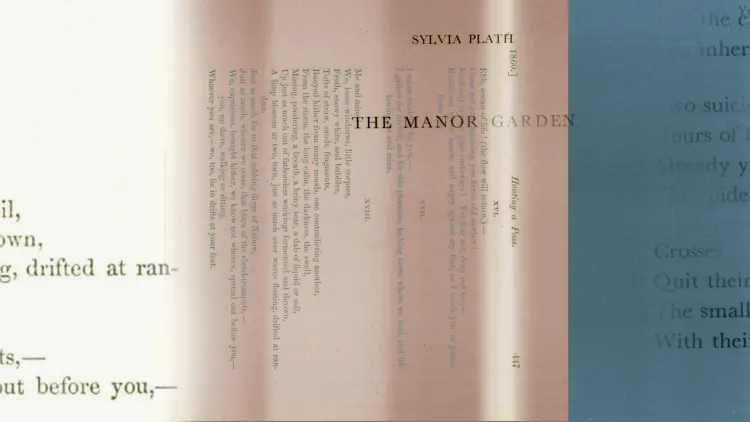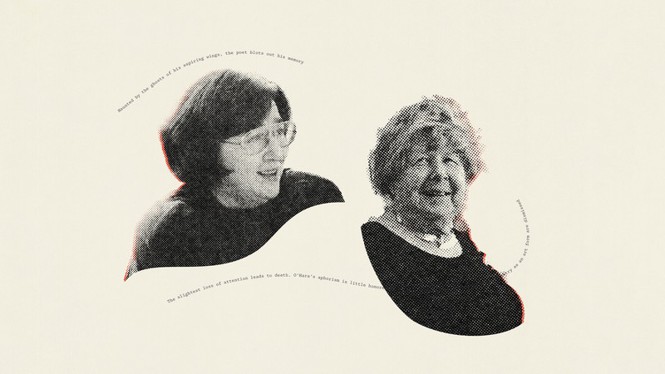Poetry Is an Act of Hope
Through verse, we can perhaps come closest to capturing events that exist beyond our capacity to describe.

This is an edition of the Books Briefing, our editors’ weekly guide to the best in books. Sign up for it here.
Poetry is the art form that most expands my sense of what language can do. Today, so much daily English feels flat or distracted—politicians speak in clichés; friends are distracted in conversation by the tempting dinging of smartphones; TV dialogue and the sentences in books are frequently inelegant. This isn’t a disaster: Clichés endure because they convey ideas efficiently; not all small talk can be scintillating; a bad sentence here or there in a novel won’t necessarily condemn the whole work.
First, here are four new stories from The Atlantic’s Books section:
- When your every decision feels torturous
- “Noon”: a poem by Li-Young Lee
- A prominent free-speech group is fighting for its life.
- The complicated ethics of rare-book collecting
Poetry is different, however. We expect more from it. Not a single word should be misused, not a single syllable misplaced—and, as a result, studying language within the poetic form can be particularly rewarding. In March and April of this year, two of America’s great poetry critics, Helen Vendler and Marjorie Perloff, died. In reading Adam Kirsch’s tribute to both, I was struck by how different their respective approaches to language were. Vendler was a “traditionalist,” per Kirsch; she liked poets who “communicated intimate thoughts and emotions in beautiful, complex language.” She was a famous close reader, carefully picking over poems to draw out every sense of meaning. For Vendler, Kirsch writes, poetry made language “more meaningful.”
Perloff wasn’t as interested in communicating meaning. Her favorite avant-garde poets used words in surprising and odd ways. As Kirsch writes, “At a time when television and advertising were making words smooth and empty, she argued that poets had a moral duty to resist by using language disruptively, forcing readers to sit up and pay attention.”
I’d reckon that neither Perloff nor Vendler relished lines that were smooth and empty, even though their preferred artists and attitudes toward reading might have differed. Ben Lerner has said that poetry represents a desire to “do something with words that we can’t actually do.” In that sense, poems are a declaration of hope in language: Even if we can’t pull off something magnificent, we can at least try.
Through poetry, we can perhaps come closest to capturing the events that feel so extreme as to exist beyond our capacity to describe them. In the February 8 issue of The New York Review of Books, Ann Lauterbach published a poem called “War Zone,” dedicated to Paul Auster, another literary great who died recently. The poem depicts not scenes of violence and gore but the hollow wordlessness many of us feel in the face of war or suffering—then it uses images of silence, blankness, and absence to fight against that unspeakability. The last line, which I won’t spoil here, points to this paradox: Words may not be able to capture everything—especially the worst things—but they can, and must, try.

When Poetry Could Define a Life
By Adam Kirsch
The close passing of the poetry critics Marjorie Perloff and Helen Vendler is a moment to recognize the end of an era.
What to Read
The Taste of Country Cooking, by Edna Lewis
Lewis’s exemplary Southern cookbook is interspersed with essays on growing up in a farming community in Virginia; many of the recipes in the book unspool from these memories. Lewis, who worked as a chef in New York City as well as in North and South Carolina, writes with great sensual and emotional detail about growing up close to the land. Of springtime, she writes, “The quiet beauty in rebirth there was so enchanting it caused us to stand still in silence and absorb all we heard and saw. The palest liverwort, the elegant pink lady’s-slipper displayed against the velvety green path of moss leading endlessly through the woods.” Her book was ahead of its time in so many ways: It is a farm-to-table manifesto, a food memoir published decades before Ruth Reichl popularized the form, and an early, refined version of the cookbook-with-essays we’re now seeing from contemporary authors such as Eric Kim and Reem Assil. The recipes—ham biscuits, new cabbage with scallions, potted stuffed squab—are as alluring as the prose. — Marian Bull
From our list: eight cookbooks worth reading cover to cover
Out Next Week
???? First Love, by Lilly Dancyger
???? América del Norte, by Nicolás Medina Mora
???? The Lady Waiting, by Magdalena Zyzak
Your Weekend Read

The Diminishing Returns of Having Good Taste
By W. David Marx
There are obvious, concrete advantages to a world with information equality, such as expanding global access to health and educational materials—with a stable internet connection, anyone can learn basic computer programming from online tutorials and lectures on YouTube. Finding the optimal place to eat at any moment is certainly easier than it used to be. And, in the case of Google, to “organize the world’s information and make it universally accessible and useful” even serves as the company’s mission. The most commonly cited disadvantage to this extraordinary societal change, and for good reason, is that disinformation and misinformation can use the same easy pathways to spread unchecked. But after three decades of living with the internet, it’s clear that there are other, more subtle losses that come with instant access to knowledge, and we’ve yet to wrestle—interpersonally and culturally—with the implications.
When you buy a book using a link in this newsletter, we receive a commission. Thank you for supporting The Atlantic.
Explore all of our newsletters.
What's Your Reaction?




















